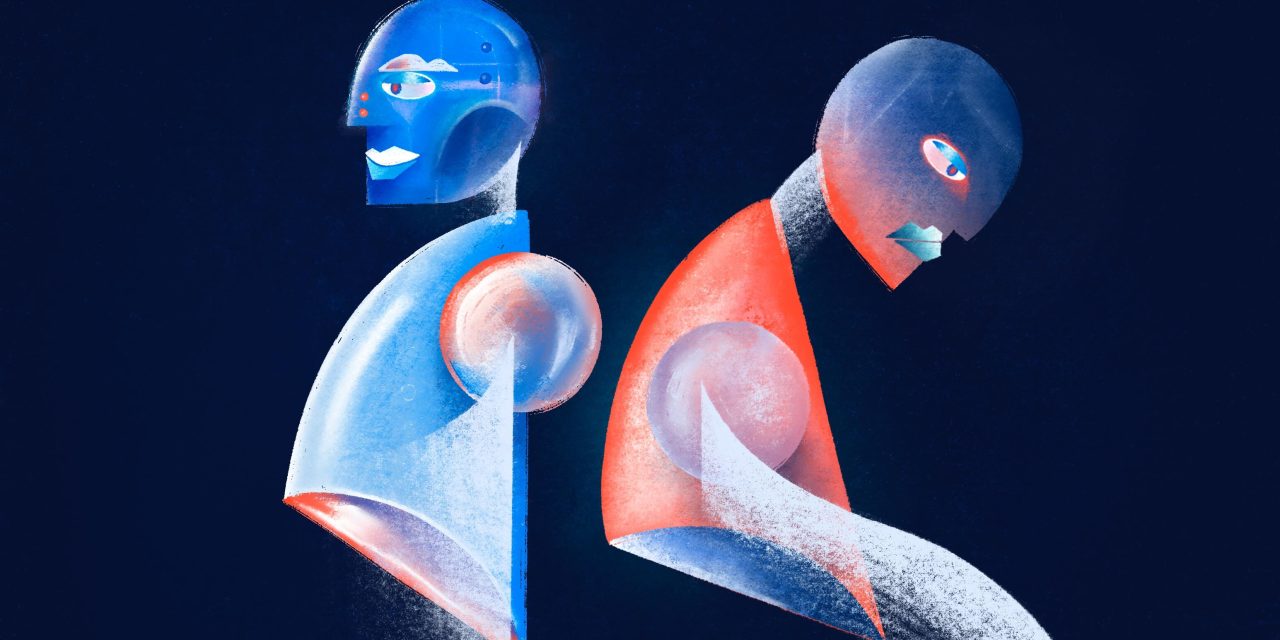There’s an epidemic of loneliness: will AI make it worse?

This article is part of WorkLife’s artificial intelligence special edition, which breaks through the hype around AI – both traditional and generative – and examines what its role will be in the future of work, for desk-based workers. More from the series →
While the ascent and the promise of the most buzzed-about new technology have been well-documented, it has also given rise to overheated headlines and dire predictions of job losses and machines taking over for human beings.
Now, it turns out that artificial intelligence might end up making us feel lonelier than we already do in an age of remote work and social isolation. It might even kill us.
That’s not another hysterical prediction. It’s from no less an authority than the Surgeon General of the U.S. Noting the epidemic of loneliness among Americans, Vivek H. Murthy recently took to the pages of The New York Times with an op-ed cautioning that our unprecedented attachment to the latest machinery could make matters worse. “We have to renegotiate our relationship with technology,” Murthy wrote, noting that social disconnection can lead to a higher risk of anxiety, depression, heart diseases, dementia, stroke and early death.
Even though rates of loneliness have improved since the thick of the pandemic, the latest data from Gallup reveals that 17% of American adults — or 44 million people — still experience significant loneliness.
“Individuals are becoming apprentices to AI rather than the colleagues and associates of human beings,” said Jo Ann Oravec, a business professor at the University of Wisconsin and author of the recent book “Good Robot, Bad Robot: Dark and Creepy Sides of Robotics, Autonomous Vehicles and AI.” Much of the population, she contended, “have few opportunities to learn the soft skills that will help them reach out and build friendships.”
Oravec noted the much-publicized impact AI could have on routine work, potentially eliminating scores of junior-level and support roles across numerous industries. That stands to make the integration of new employees more difficult — and likely make people feel still more isolated in the workplace.
“Young people learn the ropes in an organization by asking questions and getting answers from human beings as to how things work,” Oravec said. “With AI, an increasing amount of this interaction is with machines and not with humans.” Because of our embrace of innovations like ChatGPT, she went on, workers “are becoming isolated and lonely in their workplace and community contexts because they have not learned the skills that enable them to build sustaining friendships.”
“While AI undoubtedly brings remarkable innovation and opportunity, it’s important to remain mindful of its potential impact on our feelings of loneliness,” added Goran Luledzija, CEO of the translation software platform Localizely, who, having worked on numerous AI projects, has witnessed firsthand the double-edged sword that is advanced tech.
Luledzija frets that in the workplace, the ascent of AI could lead to a decline in the “culture of humanity,” as he put it — especially in a world where such technology is already viewed by many as superior to humans. “AI systems are designed to be efficient, and human interaction is often considered inefficient,” he explained. “As AI becomes more sophisticated, there’s a fear that people might feel replaceable, causing them to withdraw further from the workplace community.”
To combat feelings of loneliness, it’s crucial to strike a balance between AI and human connection, Luledzija argued, urging employers to create spaces and opportunities for their people to engage with one another, foster teamwork and maintain a sense of belonging even as they come to rely more on technological breakthroughs. “In doing so, we can harness the incredible power of AI while preserving the essential human interactions that keep us connected and fulfilled,” he said.
David Espindola, founder of the tech and consulting firm Brainyus and author of the forthcoming book “Soulful: You in the Future of Artificial Intelligence,” worries that as AI further tightens its grip on the culture and the workplace and becomes more “human-like,” we could well come to prefer the companionship of machines to other people.
“As technology advances and AI becomes more prevalent, the lines between genuine human connections and interactions with emotionally capable machines will blur,” he said. “Even though machines may be able to interpret and possibly even mimic our emotions, reacting to us as if they truly knew us as personal friends, they lack essential aspects of being human — they can’t feel anything.”
Humans must remain on guard to ensure their “anthropomorphic tendencies” are kept in check, he advised, adding that “looking for AI to solve our loneliness problem may create a more profound sense of hopelessness and depression.”
What’s more, as those feelings of hopelessness and depression grow right alongside AI’s role in our lives, Ryan Culkin, chief counseling officer of the mental health provider Thriveworks, worries that people will increasingly turn to the technology for mental health support.
“Just as Zoom could not place a face-to-face catchup with a friend, AI cannot replace therapy,” he maintained. “There is no way that an algorithm can ever understand a human the way another living, human being can. While it can be used as a sounding board for specific personal issues, which may momentarily alleviate feelings of loneliness, for real long-lasting change we need human-to-human connection.”


